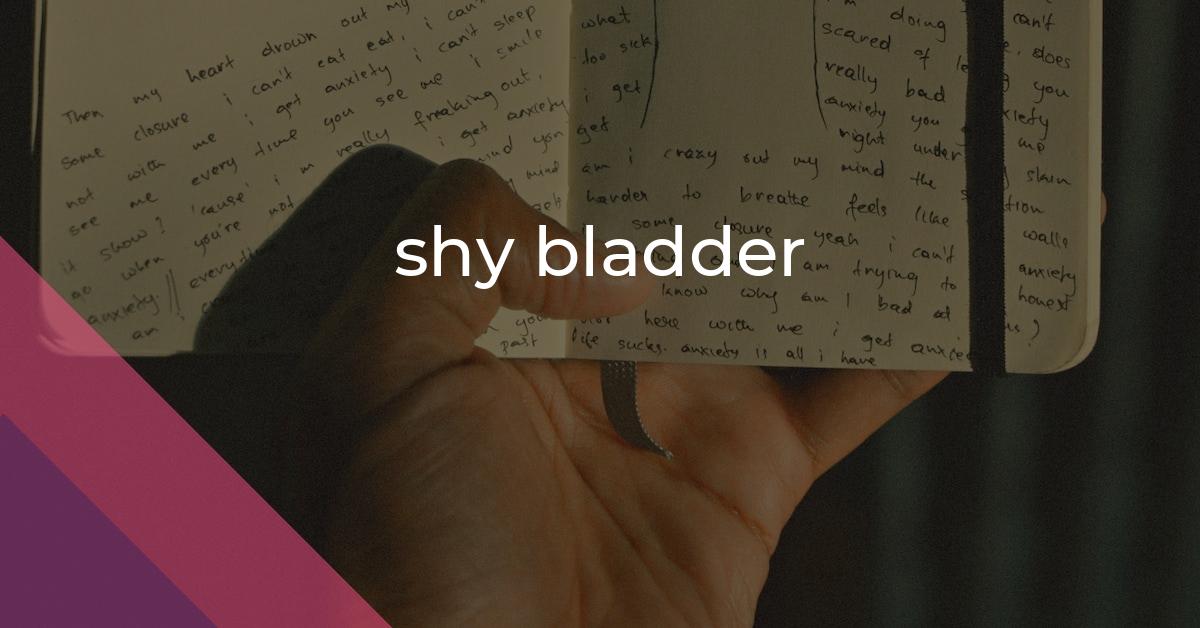shy bladder: Idiom Meaning and Origin
What does ‘shy bladder’ mean?
The idiom "shy bladder" refers to a difficulty in urinating in public or in the presence of others due to feelings of self-consciousness or anxiety. This condition is also known as paruresis.

Idiom Explorer
The idiom "territorial pissing" refers to the act of marking one's territory or asserting dominance, often through aggressive or confrontational behavior. This expression is used figuratively to describe situations where individuals or groups assert their power or authority over a particular area or domain.
The idiom "take the pee" is a colloquial expression that means to mock or make fun of someone in a light-hearted or teasing manner. It is commonly used in informal conversations and is primarily used in British and Australian English.
The idiom "sweat bullets" means to be extremely nervous or anxious, often causing one to perspire heavily. It conveys the idea of feeling intense pressure or stress.
The idiom "sweat bricks" means to feel extremely nervous, anxious, or scared, often due to a stressful or intense situation.
The idiom "stumbling-block" refers to an obstacle or difficulty that hinders progress or success.
The idiom "stew in one's juices" means to be left alone with one's thoughts or feelings, usually in a state of anger or frustration.
The idiom "spill one's guts" means to confess or reveal something very personal or private, often in an emotional or dramatic way.
The idiom "spend a penny" means to use the restroom or to go to the bathroom, typically referring to women. It originates from the practice of having to pay a penny to use public toilets in the UK.
The idiom "spare someone's blushes" means to prevent someone from feeling embarrassed or ashamed in a particular situation.
An idiom meaning a sensitive issue or topic that causes discomfort or irritation when discussed.
Unpredictable Urinary Inhibition
The idiom "shy bladder" is used to describe a condition where a person is unable to urinate in the presence of others or in certain situations, often due to feelings of embarrassment or anxiety. This condition can be particularly challenging in crowded settings such as airports, sports stadiums, or busy public restrooms.
One of the main characteristics of a shy bladder is the inability to urinate in public restrooms or when others are nearby. Individuals with shy bladder may experience extreme discomfort and irrational anxiety when faced with these situations.
The term "shy bladder" is relatively recent and gained popularity in the late 20th century. It is derived from the word "shy," meaning to be hesitant or wary, and "bladder," which refers to the organ responsible for storing and releasing urine in the human body.
The exact causes of shy bladder are not fully understood, but it is believed to be a psychological condition closely associated with social anxiety disorder or specific phobias.
Treatment for shy bladder may involve various approaches depending on the severity and individual circumstances. Cognitive-behavioral therapy (CBT) is commonly used to address the underlying anxieties and irrational thoughts associated with paruresis. Exposure therapy, a form of CBT, gradually exposes individuals to situations that trigger their fear of urinating in public, helping them build confidence and overcome the anxious response.
In some cases, medication such as anti-anxiety drugs or alpha-blockers may be prescribed to assist individuals with shy bladder. However, these medications are typically used as a complementary treatment and are not considered a cure.
Despite its prevalence, shy bladder is an often misunderstood and stigmatized condition. Many individuals suffering from paruresis may feel isolated and embarrassed, which can have a significant impact on their quality of life. Awareness and education about shy bladder are crucial in reducing stigma and providing support for those affected.
Another related idiom is "pee one's pants." The fear and hesitation associated with shy bladder can sometimes lead to the inability to hold urine, resulting in embarrassing situations where individuals may accidentally urinate in their pants.
Individuals with shy bladder may also "fight shy of" situations that trigger their fear of urinating in public. They may actively avoid going to busy public restrooms or events where they anticipate having difficulties urinating.
The idiom "shy bladder" refers to the condition where a person is unable to urinate in the presence of others. It is associated with feelings of embarrassment and anxiety, often arising from social anxiety disorder or specific phobias. Treatment options include cognitive-behavioral therapy and medication, but the exact causes and effective interventions may vary on an individual basis. Further research and understanding of shy bladder can help improve support and resources for individuals with this condition.
Example usage
Here are three examples of how the idiom "shy bladder" can be used in a sentence:
1. "I couldn't use the public restroom because I have a shy bladder."
2. "Whenever I'm in a crowded place, my shy bladder kicks in and I struggle to urinate."
3. "He always tries to find a private bathroom because he has a shy bladder and gets nervous in public restrooms."
More "Medical" idioms



